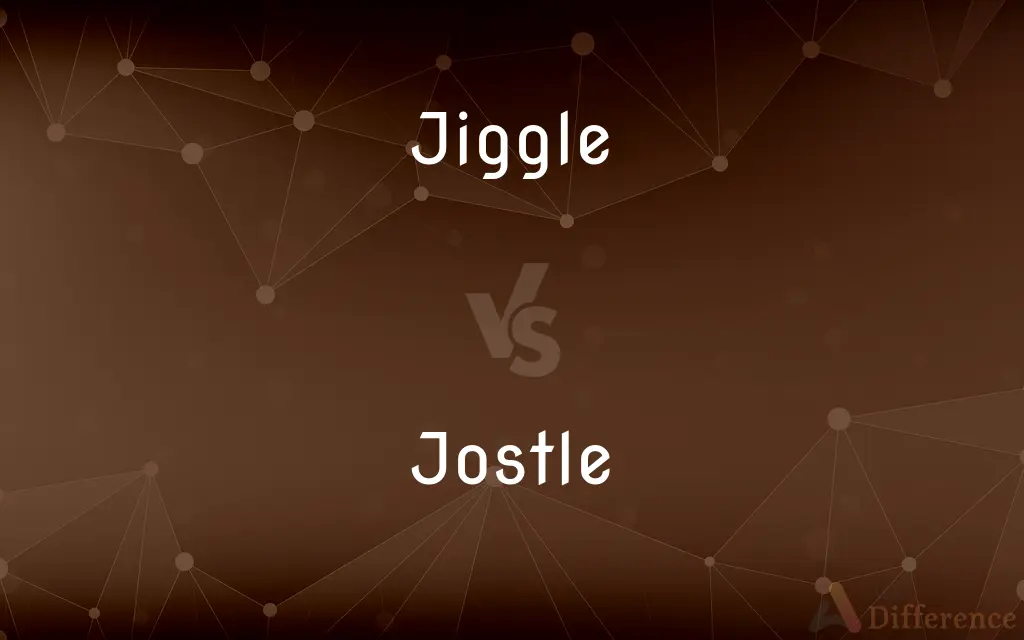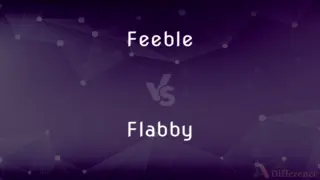Jiggle vs. Jostle — What's the Difference?
By Fiza Rafique & Urooj Arif — Updated on April 17, 2024
Jiggle refers to a quick, small, back-and-forth movement, often gentle, while jostle involves pushing or bumping against someone or something often in a crowd.

Difference Between Jiggle and Jostle
Table of Contents
ADVERTISEMENT
Key Differences
Jiggle implies a motion that is typically repetitive and slight, often used to describe movements such as a shaky hand or a loose object in motion. On the other hand, jostle describes a more forceful and direct physical interaction, which often results from individuals competing for space in a crowded area.
When something jiggles, it usually does so in a confined, consistent manner, reflecting vibrations or small oscillations, such as a gelatin dessert or a slightly wobbly table. Whereas jostling occurs in more chaotic scenarios, such as during a commute in a crowded train, where people are likely to push against each other to pass through or find a spot.
Jiggling can be either intentional or unintentional. It's often seen in scenarios where a person might jiggle a door handle to see if it's locked. In contrast, jostling is generally unintentional and a result of external pressures in crowded environments, emphasizing the lack of personal space.
The sensation associated with jiggling is generally milder and less aggressive. For instance, a phone set on a silent mode might jiggle when it vibrates upon receiving a message. Conversely, jostling is perceived as more aggressive and disruptive, like the sudden shoves one experiences in a bustling marketplace.
In terms of emotional response, jiggling might provoke annoyance or slight amusement, depending on the context, like when someone jiggles a leg continuously while sitting. Jostling, however, more often triggers feelings of irritation or stress, as seen in people getting bumped during rush hour.
ADVERTISEMENT
Comparison Chart
Definition
Small, quick, repetitive motion
Push or bump against others, often in crowds
Intentionality
Can be intentional or unintentional
Generally unintentional
Force of Movement
Gentle, with little force
More forceful, involves physical contact
Common Contexts
Loose items, wobbly objects
Crowded places, competitive environments
Emotional Response
Annoyance or amusement
Irritation or stress
Compare with Definitions
Jiggle
To move lightly and quickly up and down or side to side.
He jiggled the key in the lock until it finally turned.
Jostle
To bump, push, or shove roughly, especially in a crowd.
He was jostled by commuters as he tried to exit the train.
Jiggle
To shake slightly, often as a way to fix or adjust.
He jiggled the mouse to wake the computer from sleep mode.
Jostle
A struggle or scuffle caused by competing for space.
Fans jostled for a better view at the concert.
Jiggle
A quick, slight shaking motion.
She gave the handle a jiggle to check if it was locked.
Jostle
Involving physical contact, usually in a crowded place.
During the festival, pedestrians were jostling each other on the narrow streets.
Jiggle
A playful or nervous repetitive motion.
Nervous before the interview, she jiggled her foot continuously.
Jostle
To push against someone when moving through a crowded area.
She jostled her way through the busy market.
Jiggle
A small oscillatory motion with a rapid frequency.
The gelatin on the plate jiggled as the table was bumped.
Jostle
To compete or fight for a position.
The players jostled for position under the basketball hoop.
Jiggle
To move or rock lightly up and down or to and fro in an unsteady, jerky manner
The gelatin jiggled on the plate.
Jostle
To come in rough contact while moving; push and shove
Jostled against the others on the crowded platform.
Jiggle
To cause to jiggle.
Jostle
To make one's way by pushing or elbowing
Jostled through the guests to the bar.
Jiggle
A jiggling motion.
Jostle
To vie for an advantage or position
Jostled with several others for the job.
Jiggle
A relatively weak shaking movement.
Give the key a jiggle and see if it opens.
Jostle
To come into rough contact with while moving
Messengers who jostle pedestrians on the sidewalk.
Jiggle
(transitive) To shake something gently; to rattle or wiggle.
Jiggle the handle and see if the water stops.
Jostle
To force by pushing or elbowing
Jostled my way through the mob.
Jiggle
(intransitive) To shake, rattle, or wiggle.
The jelly jiggled in the bowl for a few moments after it was set down.
Jostle
To vie with for an advantage or position
Jostled a major shareholder for control of the business.
Jiggle
To wriggle or frisk about; to move awkwardly; to shake up and down.
Jostle
To shake or agitate
Jostled the bag of food, and the dog came running.
Jiggle
A slight irregular shaking motion
Jostle
A rough shove or agitating movement.
Jiggle
Move to and fro;
Don't jiggle your finger while the nurse is putting on the bandage!
Jostle
(ambitransitive) To bump into or brush against while in motion; to push aside.
Jostle
(intransitive) To move through by pushing and shoving.
Jostle
(transitive) To be close to or in physical contact with.
Jostle
(intransitive) To contend or vie in order to acquire something.
Jostle
To pick or attempt to pick pockets.
Jostle
The act of jostling someone or something; push, shove.
Jostle
The action of a jostling crowd.
Jostle
To run against and shake; to push out of the way; to elbow; to hustle; to disturb by crowding; to crowd against.
Systems of movement, physical, intellectual, and moral, which are perpetually jostling each other.
Jostle
To push; to crowd; to hustle.
None jostle with him for the wall.
Jostle
A conflict by collisions; a crowding or bumping together; interference.
The jostle of South African nationalities and civilization.
Jostle
The act of jostling (forcing your way by pushing)
Jostle
Make one's way by jostling, pushing, or shoving;
We had to jostle our way to the front of the platform
Jostle
Come into rough contact with while moving;
The passengers jostled each other in the overcrowded train
Common Curiosities
What is the primary difference in motion between jiggle and jostle?
Jiggle involves gentle, quick, repetitive movements, while jostle involves more forceful pushing or bumping.
Can both jiggle and jostle be done intentionally?
Jiggle can be both intentional or unintentional, whereas jostle is usually unintentional.
Where are you likely to experience jostling?
Jostling typically occurs in crowded places like subways, concerts, or markets.
Is jostling always negative?
While often seen as negative due to the discomfort it causes, jostling is sometimes just a part of navigating very crowded spaces.
Are there professional contexts where jostling is acceptable?
In sports, jostling for position can be a part of the game strategy, like in basketball or football.
How do the emotional responses to jiggling and jostling differ?
Jiggling might cause slight annoyance or amusement, while jostling can lead to stress or irritation.
How do people typically react to being jostled?
People often react negatively to being jostled due to the invasion of personal space and unexpected physical contact.
What type of force is typically used in jiggling?
Jiggling involves light, minimal force.
What objects are commonly associated with jiggling?
Loose, wobbly objects or those with elastic properties, like gelatin, are often associated with jiggling.
Can jiggling be useful?
Yes, jiggling can be a practical action to test stability or function, like jiggling a lock.
Share Your Discovery

Previous Comparison
Attractive vs. Beautiful
Next Comparison
Feeble vs. FlabbyAuthor Spotlight
Written by
Fiza RafiqueFiza Rafique is a skilled content writer at AskDifference.com, where she meticulously refines and enhances written pieces. Drawing from her vast editorial expertise, Fiza ensures clarity, accuracy, and precision in every article. Passionate about language, she continually seeks to elevate the quality of content for readers worldwide.
Co-written by
Urooj ArifUrooj is a skilled content writer at Ask Difference, known for her exceptional ability to simplify complex topics into engaging and informative content. With a passion for research and a flair for clear, concise writing, she consistently delivers articles that resonate with our diverse audience.















































